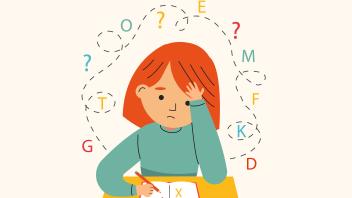Many of the reading problems students encounter are related to the five components of reading — phonological and phonemic awareness, word decoding and phonics, fluency, vocabulary, and comprehension — covered in Target the Problem! in this section).
For some students, however, the problem may be the result of a combination of factors — weakness in one or more of the five components and difficulty with some form of processing.
For other students, there may be a secondary complicating problem, such as attention, memory, or the challenge of learning English as a second language.
Processing
Successful reading and writing requires that a student is able to process several types of information. Some students may have difficulty with auditory, phonological, and/or language processing. Processing difficulties may co-exist with other difficulties, such as dyslexia and attention deficit disorders.
Auditory processing
Auditory processing refers to a set of skills related to how the brain recognizes and interprets information presented orally. This includes not just speech, but also the processing of non-speech auditory stimuli like music and environmental noise. Some people say auditory processing is “what we do with what we hear.” Humans hear sounds through the ear and then sounds are changed into electrical information that is interpreted by the brain.
Some children (approximately 2-3 percent) are diagnosed with an auditory processing disorder (APD), sometimes called Central Auditory Processing Disorder. It means something is affecting the processing or interpretation of the information a child hears. Some reading experts believe that APD is closely related to disorders of attention, general phonological processing, and language-based difficulties, and does not reflect a separate disorder.
Children with auditory processing disorder can have difficulty reading. They often find it difficult to pay attention, listen to, and remember information presented orally. They may need more time to process information. Children with an auditory processing disorder often do not recognize subtle differences between sounds in words, even though the sounds themselves are loud and clear. For more about this, see the Phonological and Phonemic Awareness section.
More information:
- What Are Central Auditory Processing Problems in Children? (LD OnLine)
- What is auditory processing disorder? (Understood)
- Central Auditory Processing Disorder (Kids Health)
Phonological processing
Phonological processing refers specifically to the processing of speech sounds (phonemes). Many poor readers have a specific weakness in phonological processing even through their other processing skills (auditory and language processing) are strong. This is often the case for students with reading disabilities. Readers with phonological processing difficulties usually have problems decoding words.
More information:
- Knowledge and Skills for Teaching Reading
- Neuroscience, Phonology, and Reading: The Oral to Written Language Continuum (Children of the Code)
Language processing
Language processing includes a variety of language abilities including reading and writing. It is a broader term than phonological processing. The research on language processing clearly shows us how important it is for parents and early caregivers to provide stimulating environments full of interesting experiences and new vocabulary words. The daily joys of reading to and talking with babies and toddlers do much to develop later language skills. Children with fewer language-based experiences are typically behind their classmates when they start school in terms of vocabulary and ability to process language. Children with a broad language processing deficit may have problems with comprehension even when they can decode words accurately. Children with severe language disorders will almost certainly have difficulty reading and writing.
More information:
- What are language disorders? (Understood)
- General Information About Speech and Language Disorders (LD OnLine)
- Speech and Language Disorders (International Psychology Services)
- Specific Language Impairment (Reading Rockets)
Additional Resources
See the Slow Processing section on Understood.
Memory
In order to read, children must be able to place information into their memories and retrieve it when needed. What helps children understand vocabulary and comprehend what they read is being able to efficiently move back and forth between what they see in print and what is stored in their memories. There are different types of memory, including short-term memory, working memory, and long-term memory.
Short-term memory allows you to store small amounts of information for brief periods of time. One example is a telephone number that you remember only until it has been dialed. Working memory allows you to hold intermediate results in your head during thinking. For instance, when you multiply 45 by 4 in your head, you have to keep a series of simple calculations in mind for a short period of time to get to the final answer. Working memory also refers to how you process new information to put it in long-term memory and how you search and retrieve the information when it needs to be remembered again. An important aspect of phonological processing is phonological working memory, shown to be a factor in reading comprehension, written expression, spelling, and retention of information. Long-term memory is where you store a virtually unlimited amount of information about the world. The knowledge we store in our long-term memory affects our perceptions of the world, and what influences in the environment we attend to.
More information:
- Enhancing School Success With Mnemonic Strategies (LD OnLine)
- Memory Strategies for Students (LD OnLine)
Additional Resources
See Working Memory: What It Is and How It Works on Understood.
Attention
Children must be able to focus their attention in order to decode words, maintain reading fluency, and understand what they read. Children’s attention problems can range from mild trouble focusing to severe difficulty maintaining or focusing attention (called ADD, or Attention Deficit Disorder). Some attention problems may involve a high degree of activity or impulsivity (called ADHD, or Attention Deficit with Hyperactivity Disorder).
The American Psychological Association’s Diagnostic and Statistical Manual of Mental Disorders (DSM) provides information about the characteristics of students with ADD and ADHD. The characteristics most common for students with ADD and difficulty with reading are: often failing to give close attention to details, often does not seem to listen when spoken to directly, often has difficulty organizing tasks and activities, and is often easily distracted by extraneous stimuli. Researchers in the field of learning disabilities conservatively estimate that approximately 20 percent of students identified as having a learning disability could also be diagnosed as having ADD.
More information:
Additional Resources
See the Children with ADHD section on Reading Rockets and the Focus and Attention section on Understood.
English language learning
Currently there are about five million students who are English Language Learners (ELLs) in U.S. public K-12 schools. The number of ELLs continues to increase, particularly students whose native language is Spanish. In terms of literacy instruction, ELLs appear to benefit from the same instructional characteristics as do most students — clear instructions, well-designed lessons, opportunities to practice new skills, and guidance and feedback from teachers. Opportunities for repeated practice and oral language activities are particularly important.
More information:
- Literacy Instruction for ELLs (ColorinColorado.org)
- Reading 101 for English Language Learners (Reading Rockets)
Additional Resources
See the English Language Learners section on Reading Rockets.
Learn more about other sources of reading difficulty
Struggling Readers
Identifying Risk Factors to Prevent Difficulties
Struggling Readers
Why Some Children Have Difficulties Learning to Read
Assessment and Evaluation
Recognizing Reading Problems
Reading and the Brain
7 Things to Know About the 1 in 5 with Learning and Attention Issues
Struggling Readers



